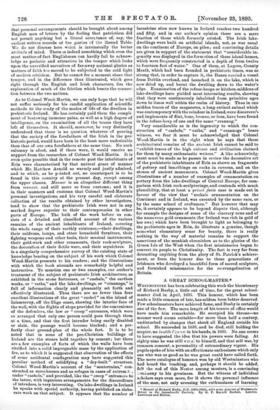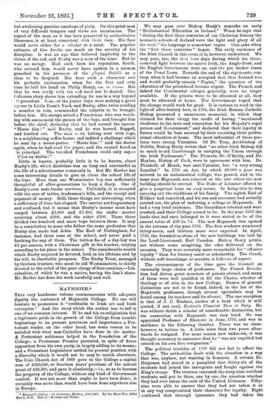A GREAT SCHOOLMASTER.*
WESTMINSTER has been celebrating this week the bicentenary of Richard Busby, a little out of time, for the great school- master died in April, 1695. This honour, which has been made a little common of late, has seldom been better deserved. Few schoolmasters have achieved fame, and Busby is certainly one of the few. The mere length of his tenure of office would have made him remarkable. He occupied his throne—no meaner word seems suitable—for more than half a century, undisturbed by changes that shook all England outside his school. He succeeded in 1638, and he died, still holding the sceptre, no inutile ln't fn in his hands, in 1695. No one seems to have suggested the idea that his powers were failing. At eighty-nine he was still ell al to himself, and that self was, by common consent, a personality of extraordinary vigour. His pupils spoke of him with an affectionate enthusiasm which only one who was as good as he was great could have called forth. The mere catalogue of honours won by old Westminsters who had heard the teaching, and, perhaps it should be added, felt the rod of this Nestor among masters, is a convincing imiinony to his greatness. But the witness of individual scholars says even more, for it shows the personal influence of the man, not only arousing the enthuasiasm of learning • Memoir of Richard Busby, D.D. (16064655), with scme Accwint of Westminsta School in the Seventeenth Century. By t. F. Balsa Barker. London Lawrence and Bailee. but awakening genuine emotions of piety. On this point men of very different tempers and views are unanimous. The aspect of the man, as it has been preserved by authoritative likenesses, is at least consistent with thair view. His face would serve either for a scholar or a saint. The popular estimate of him dwells too much on the severity of his discipline. It was an age that believed implicitly in the virtue of the rod, and Bt.sby was a man of the time. But he was no savage. Had ench been his reputation, South, who revered him, would never have spoken in a sermon preached in his preserce of the plagosi Orbilii as a class to be despised. Nor does such a character snit his pathetic exclamation, when for the first and only time he laid his hand on Philip Henry, zai GU TEXVOY. Bat that be was ready with the rod need not be denied. One ledicrous story shows him extending its use in a way beyond . precedent. Sonar of the junior boys were making a great uproar in Little Dean's Yard, and Busby, after twice sending a monitor in vain, commanded the culprits to be brought before him. His envoys seized a Frenchman who was watch- ing with amusement the games of the boys, and brought him before the chief, declaring that he had caused the uproar. "Horse him !" said Busby, and he was horsed, flogged, and hustled out. The man w. at, boiling over with rage, to a neighbouring coffee-house, and indited a challenge which he sent by a street-porter. "Horse him !" said the doctor again, when he had read the paper, and the second fared as
is principal. The terrified Frenchman could only say,— C'est un diable!"
Little is known, probably little is to be known, about Busby's life, which doubtless was as busy and uneventful as the life of a schoolmaster commonly is. But Mr. Barker has some interesting details to give us about the school life of the time. More than one Westminster boy was sufficiently thoughtful of after-generations to keep a diary. One of Busby's own note-books survives. Unluckily, it is occupied with the care of tables, tradesmen's bills, and the receipt and payment of money. Still, these things are interesting, when a sufficiency of time has elapsed. The entries are fragmentary and confused, but it seems that Busby's income must have ranged between 21,000 and £1.200, the under - master receiving about £300, and the usher 2100. These three divided two hundred and more boys between them. It may be a consolation to some who follow the same profession that Busby also made bad debts. The Earl of Nottingham, for instance, had three sons at the school, and never paid a farthing for any of them. The tuition fee of a day-boy was .E2 per annum, with a Christmas gift to his teacher, varying according to his place in the school. The considerable wealth which Busby acquired he devoted, both in his lifetime and by his will, to charitable purposes. The Busby Trust, managed by thirteen trustees, who must be old Westminsters, is chiefly devoted to the relief of the poor clergy of four counties,—Lin- colnshire, of which he was a native, having the lion's share. Mr. Barker has done his work carefully and well.











































 Previous page
Previous page